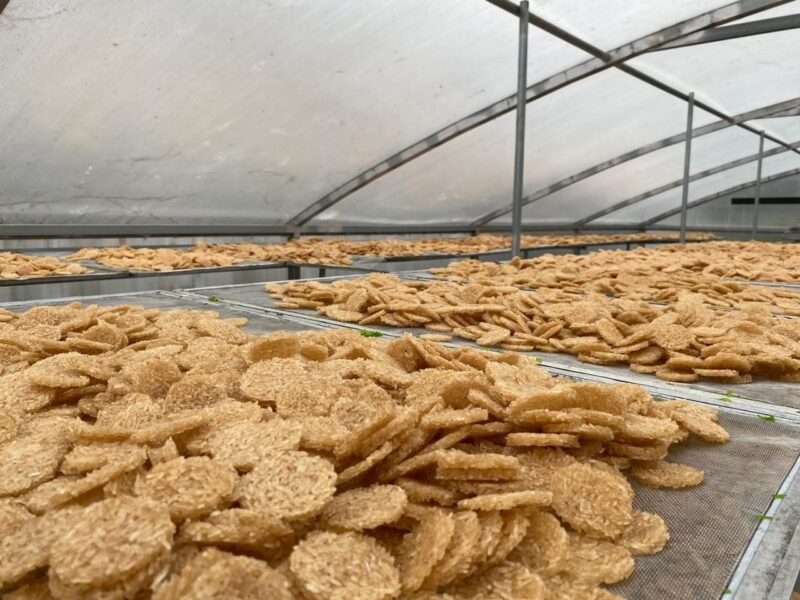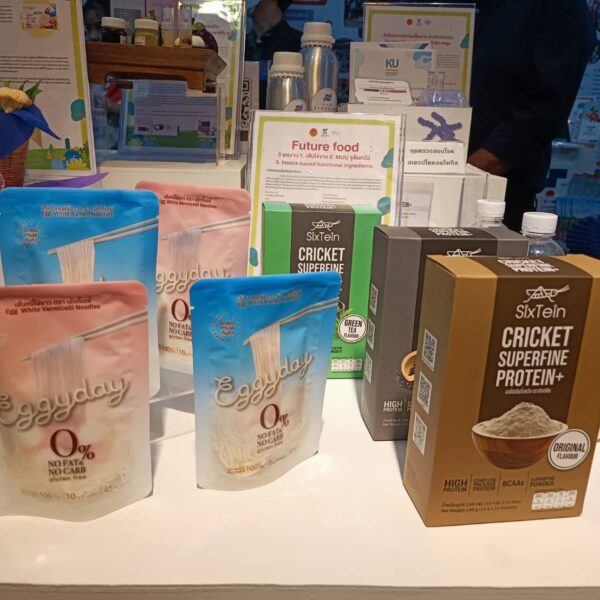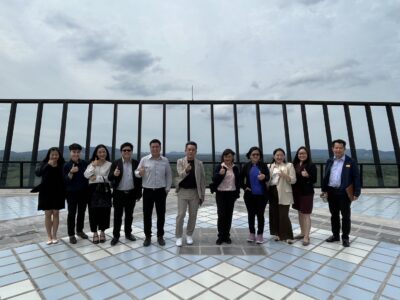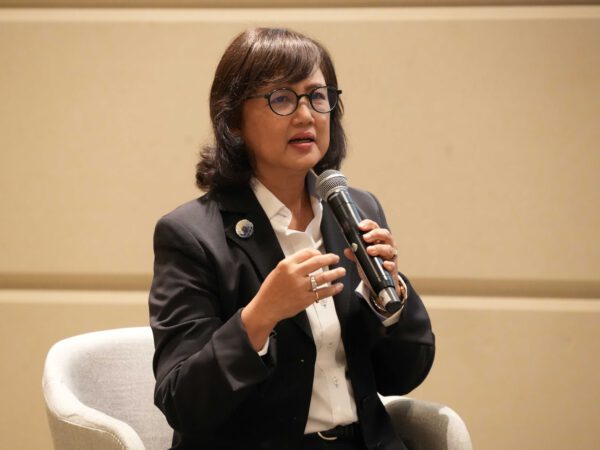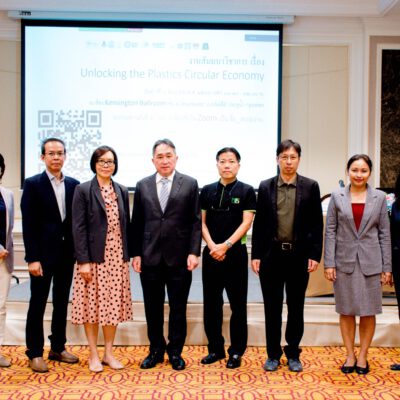In late May 2023, the Circular Economy (CE) Program of the Program Management Unit for Competitiveness (PMUC), led by Dr. Pongwipha Lorsomboon, the committee chairman, along with experts and staff, went to various provinces to monitor the progress of research projects supported by PMUC under the Circular Economy Program.
These projects included the”Zero Discharge Wastewater” initiative led by a research team from Thai Union Group Public Company Limited.
The goal of this project was to recycle wastewater for new purposes, turning discharged water into a valuable resource. The project aimed to create a zero-discharge wastewater system and serve as a model or learning center for wastewater treatment in the food industry. Industrial food factories consume a significant amount of water in various processes, including cleaning and production, resulting in high water resource usage and the generation of wastewater that needs to be treated to meet standards before disposal into waterways. The treated wastewater often had good quality, and the research team believed it could be reused by improving its quality further according to set standards. This was achieved by implementing advanced filtration systems, such as Ultra Filtration System (UF) and Reverse Osmosis System (RO), to enhance water quality suitable for industrial use. This recycling process helped reduce water consumption costs in industrial plants, enhanced their competitiveness, and contributed to environmental conservation.
According to Mr. Chanwit Polbuppa, Deputy Manager of the Engineering Department at Thai Union Group Public Company Limited and project leader, the project had made significant progress, with over 80% completion. The research team designed the system, collected data on water usage within the factories, and achieved the required water quality. They also began constructing the infrastructure to support the water filtration system, installed UF and RO water filtration systems, and tested the system to collect and utilize the RO-filtered water for various processes. The RO-filtered water was analyzed in the laboratory and met the required standards for safe consumption.
Mr. Sutthidej Amornkasemwong, the Director of the Administrative Division of the company, shared lessons learned from the project. He emphasized that the system was not new but had been in use for a long time. He noted that some projects might not succeed due to high costs associated with hiring external teams to implement the system, as external teams might not fully understand the factory’s operations. In contrast, their company created and managed the system themselves, which allowed them to understand the challenges and adapt to changes within the factory. He explained that understanding the upstream improvement, water reduction, chemical control, and gradual management was essential. He also emphasized that the “do it yourself” (DIY) approach significantly reduced costs and was achievable for small and medium-sized enterprises (SMEs) if they had the necessary knowledge and commitment.
If the project succeeds, it could serve as a valuable model for other food industry plants to efficiently manage wastewater within their facilities and reduce water management costs. After visiting the project site, it was evident that the company had constructed a suitable facility for wastewater treatment with efficient management and standards. They had installed a pre-treatment system and UF filtration system, with the RO filtration system installation underway. The company also offered opportunities for interested companies or organizations to visit and learn from their project.



An innovative project, led by a research team from Suan Sunandha Rajabhat University, to develop coconut jelly products, creating added value from substandard coconut jelly, a waste product from production processes.
This project stems from the need to address the quality control issues in coconut jelly sheet production. It was observed that a significant number of coconut jelly sheets produced did not meet quality standards, resulting in wastage. The disposal of substandard sheets led to increased production costs and expenses for their disposal, totaling approximately 275 Baht per barrel. Additionally, the disposal process required extended drying time and generated unpleasant odors. As a solution, a research team from Suan Sunandha Rajabhat University collaborated with a coconut jelly factory in Samut Songkhram province to study and experiment with transforming substandard coconut jelly sheets into value-added products. The project is divided into two sub-projects:
Quality control and enhancement of the complete coconut jelly sheet production process to produce bio-cellulose facial masks.
Creating value from substandard coconut jelly sheets by turning them into innovative coconut jelly glove masks in Samut Songkhram.
The project leader, Dr. Vittaya Mekkam, explained, “We have developed an innovative process for converting waste from coconut jelly sheet production. We conducted research on Acetobacter xylinum bacteria’s purity and their role in bio-cellulose production, as well as factors affecting the bio-cellulose production process. Furthermore, we improved the production process to meet the Primary GMP standards and developed a method to transform non-standard coconut jelly sheets into gloves to add value and minimize waste. We also developed a hand serum enriched with natural local extracts, and we shared this knowledge and technology with local coconut jelly producers to enhance their competitiveness.”
After conducting on-site inspections to track the progress of this project, it was found that the research team had achieved about 70% of their goals. They successfully produced bio-cellulose facial masks and worked on patent applications. The remaining tasks include fine-tuning the glove cutting equipment and developing packaging solutions.
Mr. Phakpoom Permmongkol, a consultant for the research project from Research X Co., Ltd., noted, “International markets are showing a significant interest in our bio-cellulose facial masks, especially in the beauty industry due to its natural origin. Most customers are cosmetic clinics and various brand counters, both in Asia and Western regions. The company has exported the product to several countries, with South Korea being one of the most significant markets. There are plans to develop other products in collaboration with the research team in the future, such as under-eye and neck masks, which are also in high demand.”

Another project, aimed at producing construction materials using coal ash as a base, was initiated in collaboration with the researchers from Rajamangala University of Technology Isan and Integrate Tech Research Center Co., Ltd.
This project was a response to the needs of Integrate Tech Research Center Co., Ltd., which operates research services for power plants in Prachinburi Province. They use coal ash and biomass fuel in their power production process, generating by-products like fly ash in significant quantities. The project aims to turn this waste into three types of construction materials: lightweight concrete blocks, interlocking floor blocks, and curbstones, all of which meet or exceed standard specifications. These products are eco-friendly, reduce the need for Portland cement, and possess characteristics such as acid resistance, sulfate resistance, and abrasion resistance, in addition to being cost-effective. These products can be used in various applications, including walls, pavements, roads, and curbs, contributing to environmental sustainability and adding economic value to the construction material industry.
Asst. Prof. Dr. Giatsuda Samana, the project leader, stated, “The research team has successfully developed ready-made construction materials using coal ash as the primary ingredient. These products meet the standard specifications, such as lightweight concrete blocks (TIS 58-2560), interlocking floor blocks (TIS 827-2531), and curbstones (TIS 59-2561). These products are eco-friendly, reduce the use of Portland cement, and offer characteristics like acid resistance, sulfate resistance, and abrasion resistance. They are easy to produce, cost-effective, and suitable for various construction applications. They provide an environmentally friendly alternative to traditional construction materials and contribute to environmental conservation.”
After conducting on-site visits to monitor progress, it was found that this project had achieved more than 80% of its objectives. The research team successfully developed construction materials using coal ash and is currently working on marketing plans. The target markets include traditional construction material suppliers, small and medium-sized enterprises, and affiliated companies interested in collaborating. Private sector partners have expressed their readiness to work with the research team to bring these products up to standard in the future.

































